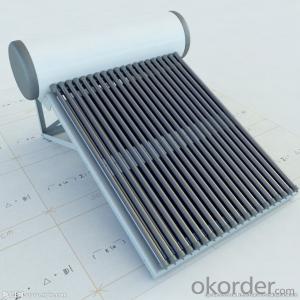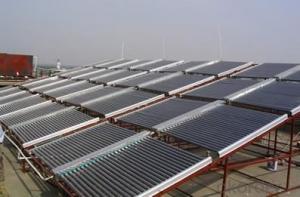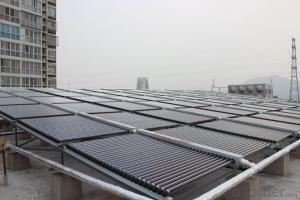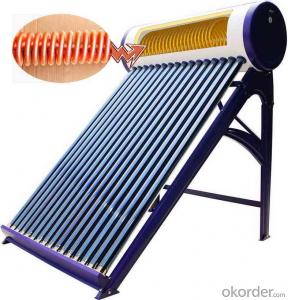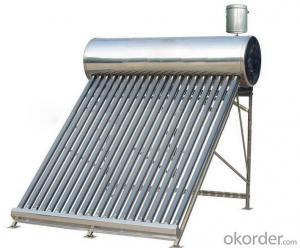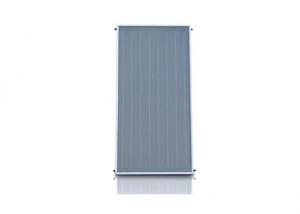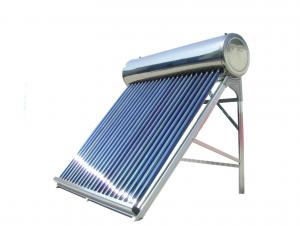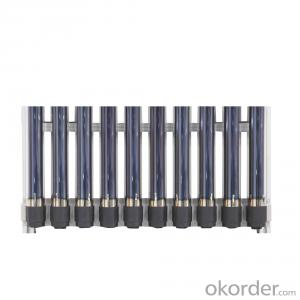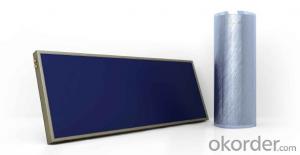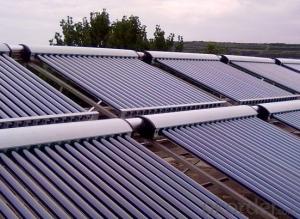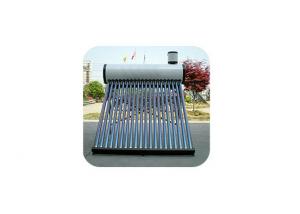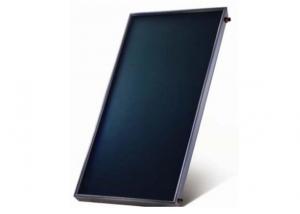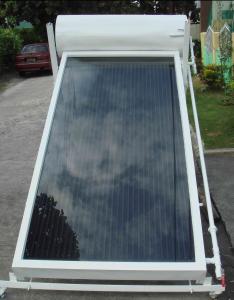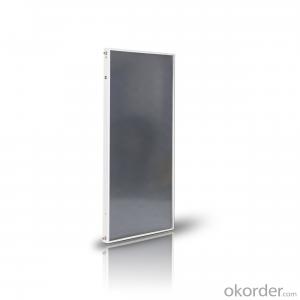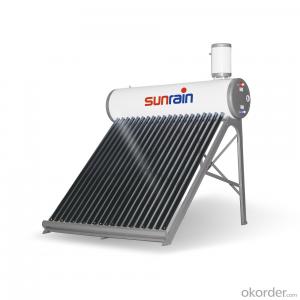100L-200L Solar Hot Water System China Famous Brand
- Loading Port:
- China main port
- Payment Terms:
- TT OR LC
- Min Order Qty:
- 10 set
- Supply Capability:
- 10000 set/month
OKorder Service Pledge
OKorder Financial Service
You Might Also Like
Solar water heaters features
1. The upright tank can make the water temperature to a high level. It can hot the water instantly
2. The tank inside the building, the hot water loses less energy than the normal one
3. The solar collector and the tank of solar water heater is separated, that makes the system combine with the building perfectly, which will reduce the sightseeing for the building and environment around
4. Back up with electric heater so that in the day without sunshine hot water can also be used
5. Can be combined with gas or electric heater
6. Max. Pressure: 12bar; Operating Pressure: 6 bar
7. It can be used for other function, such as warming
Solar water heaters working principle
1. The solar collector absorbs solar energy and transmits it to the solar water heater tank through circulation
2. When the temperature of the collector reaches the set value, the controller starts the circulation pump automatically
3. The circulation pump makes heat-conducting liquid circulate automatically
4. The heat-conducting liquid transfers heat to water by lower heat exchanger in the water tank.
5. When the temperature difference between solar collector and heat pipe solar water heaters tank doesn't reach the set value, the circulation pump will be shut automatically
6. In case the temperature of the water tank does not reach Tmax, Electric Heating Element will start to work automatically
Solar water heaters working station component:
1. Operating screen
2. Manometer
3. Pump speed adjust switches
4. Temperature difference circulation pump
5. Flow rate indicator
6. Return circuit connector
7. Safety valve
8. Expansion vessel connector9. Return circuit connector
10. Wall mounting
11. Expansion vessel:8L
12. Pressure resistance: 10 bar pressure for expansion vessel
Solar water heaters specification:
Description | solar water heaters |
Material of out manifold | 0.55mm thickness color steel/ fluorine carbon steel |
Material of inner tank | Food grade 2.0 mm thickness SUS304 stainless steel |
Tank insulating layer | 40mm 45kg/m³ high-density polyurethane foamed |
Inlet and outlet hole | Male G1'' |
Max pressure | 0.6 Mpa |
Solar collector tube | 3.3 Borosilicate glass with N/Al coating |
Thickness of glass tube | 1.6mm |
Vacuum tube tightness | P≤0.005 Pa |
Absorption | as=0.93-0.96 (AM1.5) |
Emission ratio | εh=0.04-0.06 (80C±5C) |
Idle sunning property parameters | Y=220~260m2.C/KW |
Average heat loss coefficient | ULT=0.6~0.7W/(m2.C) |
Bracket: | 2.0mm thickness aluminum alloy |
Tank weight | 75KGS |
Tank size | 560mm Dia x 1810mm Height |
Tank capacity | 300L |
Solar collector | 2pcs 58x1800x15tube solar collector |
Absorber area | 2.811 m² |
Working station | SP116 working station |
Heat exchanger length | Upper:12m, Underside:18m |
Solar water heaters details show:
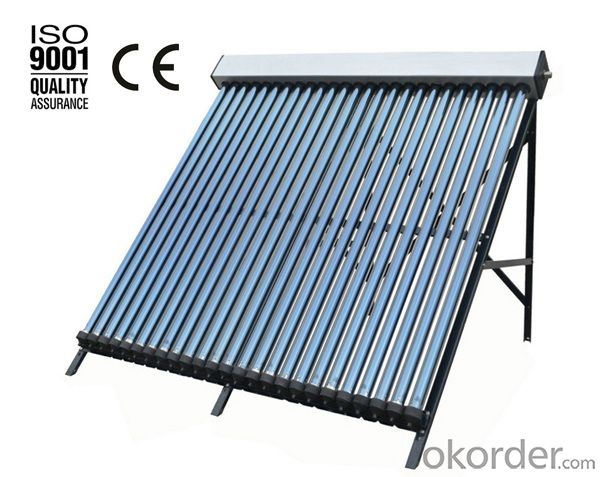
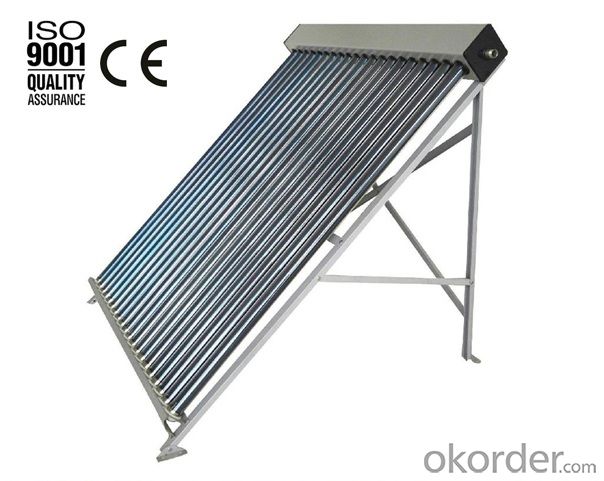
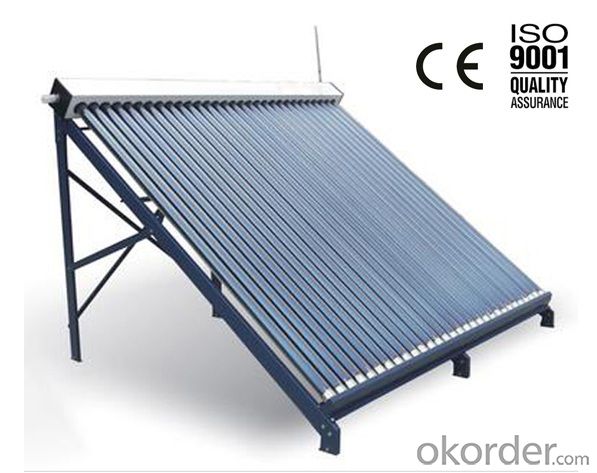
Benefits of this kind of solar water heaters:
1. Prolong the life of your existing water heater
2.Costs less than an electric, gas or oil water heater
3.No maintenance required
4.Lasts longer than a traditional hot water heater
5.Reduce your water heating costs
- Q:Can a solar water heater be used in areas with limited access to wastewater treatment facilities?
- Yes, a solar water heater can be used in areas with limited access to wastewater treatment facilities. Solar water heaters use the sun's energy to heat water, reducing the need for traditional energy sources and thus reducing the overall water use. This means that less wastewater is generated compared to conventional water heating methods. Additionally, solar water heaters can be designed to be more energy-efficient, resulting in even less wastewater production. This is particularly beneficial in areas with limited access to wastewater treatment facilities, as it reduces the burden on the existing infrastructure. Furthermore, solar water heaters can be combined with other water-saving technologies, such as low-flow fixtures and rainwater harvesting systems. By using these additional measures, the overall water consumption can be reduced, minimizing the need for extensive wastewater treatment facilities. Overall, while a solar water heater may not completely eliminate the need for wastewater treatment facilities, it can significantly reduce the amount of wastewater produced in areas with limited access to such facilities. This makes solar water heaters a viable and sustainable option for water heating in these areas.
- Q:The house is ready to install a solar water heater, but do not know what kind of good do not know how to distinguish between bad? Here's a home called "God" brand, do not know how this brand? Want to know friends with us!! thank you!.....
- At present, the domestic solar water heater market sales of a wide range of solar collector, in accordance with the type to distinguish, can be divided into the vacuum tube and the plate; in accordance with the structure of distinction can be divided into integral and split; in accordance with the production process division, can be divided into pressure and non pressure. At present, most of the domestic solar water heaters sold in the market are mostly non pressure vacuum tube type solar water heater. When we buy domestic solar water heater, we should pay attention to the following points:
- Q:Can a solar water heater be used in areas with limited propane availability?
- Yes, a solar water heater can be used in areas with limited propane availability as it operates solely on solar energy to heat water, eliminating the need for propane or any other fuel source.
- Q:Can a solar water heater be used in areas with limited access to energy conservation initiatives?
- Yes, a solar water heater can be used in areas with limited access to energy conservation initiatives. Solar water heaters are a self-sustaining technology that rely on sunlight to heat water, reducing the need for traditional energy sources. They can be installed in remote areas where access to energy-saving initiatives may be limited, providing a cost-effective and environmentally friendly solution for hot water needs.
- Q:Can a solar water heater be used in areas with high levels of saltwater exposure?
- Indeed, areas with high levels of saltwater exposure can accommodate the use of a solar water heater. Nevertheless, it is crucial to take into account the potential corrosive impact saltwater may have on the system. To address this concern, it is advisable to employ materials specifically engineered to resist corrosion caused by saltwater. For instance, incorporating stainless steel or titanium components can safeguard the system against damage resulting from saltwater exposure. Moreover, regular maintenance and cleaning of the system will be imperative to eliminate any salt deposits that may accumulate and potentially compromise the solar water heater's efficiency. In conclusion, by implementing proper precautions and maintenance measures, a solar water heater can effectively function in areas with high levels of saltwater exposure.
- Q:What are the environmental benefits of using a solar water heater?
- Using a solar water heater has several environmental benefits. Firstly, it reduces the reliance on fossil fuels such as natural gas or coal, which are commonly used to heat water. By using the sun's energy to heat water, we can significantly reduce greenhouse gas emissions and combat climate change. Additionally, solar water heaters do not emit any air pollutants or harmful gases during their operation. This helps to improve air quality and reduces the health risks associated with air pollution. Furthermore, solar water heaters require minimal maintenance and have a long lifespan, reducing the need for frequent replacements and thereby minimizing waste generation. This helps to conserve resources and reduce the environmental impact associated with manufacturing and disposing of traditional water heaters. Moreover, solar water heaters rely on a renewable energy source – the sun. Unlike fossil fuels, which are finite and contribute to resource depletion, solar energy is abundant and will continue to be available for the foreseeable future. By utilizing this clean and sustainable energy source, we can reduce our overall carbon footprint and contribute to a more sustainable and environmentally friendly future. Overall, the environmental benefits of using a solar water heater are significant. They include reducing greenhouse gas emissions, improving air quality, conserving resources, and utilizing a renewable energy source. By adopting solar water heating technology, we can play our part in mitigating climate change and transitioning to a cleaner and more sustainable energy system.
- Q:How does a solar water heater affect water heater efficiency?
- A solar water heater can significantly improve water heater efficiency. Unlike traditional water heaters that rely on electricity or gas to heat water, solar water heaters use energy from the sun to heat the water. This reliance on renewable energy reduces the amount of electricity or gas needed to heat the water, resulting in lower energy consumption and cost savings. Solar water heaters consist of solar collectors that absorb sunlight and convert it into heat energy. This heat is then transferred to the water stored in a tank, raising its temperature. By harnessing the power of the sun, solar water heaters can provide a consistent and reliable source of hot water without relying solely on non-renewable energy sources. The impact of a solar water heater on water heater efficiency is twofold. Firstly, it reduces the amount of electricity or gas consumed, leading to lower energy bills and reduced environmental impact. Secondly, solar water heaters are designed to efficiently capture and transfer heat energy from the sun to the water, maximizing the efficiency of the heating process. Solar water heaters are also equipped with insulation and heat retention features that help to minimize heat loss. This ensures that the heated water remains hot for longer periods, reducing the need for constant reheating. The combination of efficient heat transfer and heat retention features further enhances the overall efficiency of the solar water heater. It is important to note that the efficiency of a solar water heater may vary depending on factors such as the climate, available sunlight, and the size and design of the system. However, even in regions with less sunshine, solar water heaters can still provide a substantial amount of hot water and contribute to energy savings. In conclusion, a solar water heater has a positive impact on water heater efficiency by reducing energy consumption and cost, maximizing the utilization of renewable energy, and incorporating features that minimize heat loss. Investing in a solar water heater can significantly improve the overall efficiency of a water heating system while promoting sustainability and reducing environmental impact.
- Q:Solar water heater manufacturing materials
- At present, China's market is the universal glass solar heat collection vacuum tube. The structure is divided into the outer tube, inner tube, selective absorbing coating, getter, stainless steel clip, vacuum jacketed etc.. The collector of foreign mature are flat plate collector, flat plate collector has the advantages of long service life, high stability, Recyclable advantages, but because of serious ATM collector cost slightly higher, a lot of domestic production of low price flat collector performance is not good, so it is the main performance of domestic solar energy flow manufacturers distorted flat plate collector.
- Q:Can a solar water heater be used to provide hot water for industrial processes?
- Indeed, hot water for industrial processes can be provided by a solar water heater. These water heaters are specifically designed to harness solar energy for the purpose of heating water. They consist of solar collectors that absorb sunlight and convert it into heat, which is then transferred to the water. The resulting heated water can be utilized in a variety of industrial applications, including cleaning, sterilization, and heating in manufacturing processes. Solar water heaters offer numerous advantages for industrial use, making them a sustainable and cost-effective alternative to traditional heating systems. By utilizing solar energy, industries can decrease their reliance on fossil fuels and reduce their carbon footprint. Additionally, solar water heaters ensure a consistent supply of hot water throughout the day, even during periods of high demand. However, it should be noted that the feasibility of using a solar water heater for industrial processes depends on several factors, such as the size and scale of the industrial operation, the temperature requirements, and the availability of sunlight in the specific location. In certain cases, additional storage tanks or backup heating systems may be necessary to guarantee a continuous supply of hot water. Overall, with careful planning and consideration of the specific industrial needs, a solar water heater can certainly serve as a reliable source of hot water for industrial processes, offering both environmental and economic benefits.
- Q:How does the efficiency of a solar water heater change with different water temperatures?
- The efficiency of a solar water heater generally decreases with higher water temperatures. This is because solar water heaters work by harnessing the heat from the sun to warm the water. As the water temperature rises, the temperature difference between the water and the surrounding environment decreases, resulting in a lower driving force for heat transfer. Consequently, the rate of heat transfer from the solar collector to the water decreases, leading to a decrease in the overall efficiency of the system. At lower water temperatures, the efficiency of a solar water heater tends to be higher. This is because there is a greater temperature difference between the water and the ambient temperature, creating a stronger driving force for heat transfer. As a result, the solar collector can transfer heat more efficiently to the water, maximizing the system's overall efficiency. However, it is important to note that the efficiency of a solar water heater is also influenced by other factors such as the design of the system, the quality of the solar collector, and the insulation of the storage tank. These factors can mitigate the impact of water temperature to some extent. Additionally, the efficiency of a solar water heater may vary depending on the specific design and technology used in the system, as different types of solar collectors and heat transfer mechanisms can have varying performance characteristics.
1. Manufacturer Overview |
|
|---|---|
| Location | |
| Year Established | |
| Annual Output Value | |
| Main Markets | |
| Company Certifications | |
2. Manufacturer Certificates |
|
|---|---|
| a) Certification Name | |
| Range | |
| Reference | |
| Validity Period | |
3. Manufacturer Capability |
|
|---|---|
| a)Trade Capacity | |
| Nearest Port | |
| Export Percentage | |
| No.of Employees in Trade Department | |
| Language Spoken: | |
| b)Factory Information | |
| Factory Size: | |
| No. of Production Lines | |
| Contract Manufacturing | |
| Product Price Range | |
Send your message to us
100L-200L Solar Hot Water System China Famous Brand
- Loading Port:
- China main port
- Payment Terms:
- TT OR LC
- Min Order Qty:
- 10 set
- Supply Capability:
- 10000 set/month
OKorder Service Pledge
OKorder Financial Service
Similar products
New products
Hot products
Hot Searches
Related keywords
